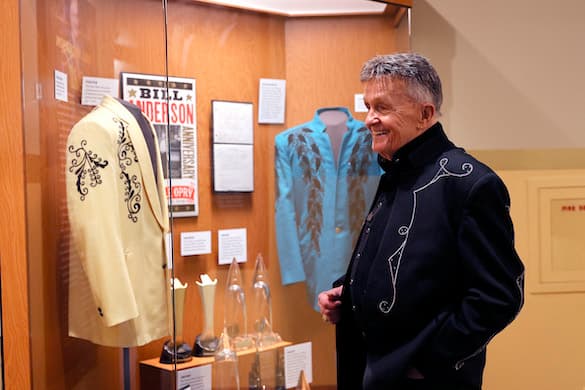Why Isn’t Country Music’s Bill Anderson a Household Name?
Although his record as a performer is substantial — he has placed more than 80 albums on the Billboard charts — his greatest claim to immortality may be as a songwriter.

Chris Young is, I gather, a country musician of some stature. He was the winner of a downhome variation of “American Idol” called “Nashville Star” and has had a number of top 10 hits. Whoops and hollers came from the ladies in the audience when Mr. Young recently took the stage at the Grand Ole Opry, the iconic music venue just outside of downtown Nashville. Those may have been well deserved, but you know what? Mr. Young can’t hold a candle to Bill Anderson.
Mr. Anderson was up toward the beginning of the program — the Grand Ole Opry is a tightly-run ship that typically features eight different acts — and he is, as a singer and songwriter, decidedly old school. If Mr. Young’s anthemic songs betray a squishy brand of post-feminist sensitivity, Mr. Anderson is made of tougher stuff, trading, as he does, in conjugal homilies written with a keen eye for the contradictions inherent to our species. If that sounds too highfalutin, let’s just say that he’s got our number and isn’t going to let us forget it.
Mr. Anderson came on stage and belted out three songs: “Good Time Gettin’ Here,” “Give It Away,” and “Suppertime,” the first two of which he had a hand in writing and the last of which is a gospel staple of the country music canon. A performer has a right to his druthers, but I much preferred Mr. Anderson’s songs, largely because they trade in the pungent wordplay and flatly stated ironies that are among the gifts of popular music originating south of the Mason-Dixon Line.
Did I say that Mr. Anderson was old school? He is, let’s say, of a certain age. Mr. Anderson’s stage presence and elfin demeanor bely his 85 years. Not a few of us in the house caught ourselves short when he sprung perilously close to the edge of the stage. Would that the rest of us were as spry.
Mr. Anderson isn’t exactly a household name. Even proud owners of compilations featuring Hank Williams, Johnny Cash, and Loretta Lynn might scratch their heads trying to get a bead on just who this man might be. Although his record as a performer is substantial — Mr. Anderson has placed more than 80 albums on the Billboard charts — his greatest claim to immortality may be as a songwriter.
Back in 1957, a 19-year old Mr. Anderson took his guitar to the rooftop of a hotel at Commerce, Georgia, and wrote something called “City Lights.” A country music legend, Ray Price, took a shine to the song, and things were never again the same for “Whisperin’ Bill” after he brought it to the studio. “City Lights” was a hit.
Forget the 40 top-20 hits that followed in its wake. Consider, instead, some of the musicians who have covered Mr. Anderson’s songs — among them Dean Martin, Aretha Franklin, James Brown, Elvis Costello, Charley Pride, Connie Smith, and Jerry Lee Lewis. Even a Nobel laureate has sung the praises of Mr. Anderson’s lyrical acuity: That would be Bob Dylan, don’t you know.
The Country Music Hall of Fame and Museum is hosting “Bill Anderson: As Far As I Can See,” an exhibition outlining a career that spans a good seven decades. Born at Columbia, South Carolina, Mr. Anderson dreamt of baseball glory even as he found himself enraptured by the music heard over the family radio.
After “City Lights” became a standard, Mr. Anderson wrote, performed, and tried his hand at — well, almost everything: journalism, spinning records on the radio, hosting a variety show, acting (on “One Life to Live,” of all things), and appearing on game shows, including the immortal “Match Game” and the possibly better-left-unmentioned “The Better Sex.”
Among the items on display in “As Far As I Can See” are Mr. Anderson’s 1958 Martin D-28 guitar, a Royal Electric typewriter used for song lyrics and answering fan mail, a rhinestone-studded suit custom-made by Nudie’s Rodeo Tailors, and the lyrics, with corrections, for the aforementioned “Give It Away.”
The song, as eviscerating a take on marital discord and the burdens of memory as you could imagine, was co-written with Jamey Johnson and Buddy Cannon, and subsequently taken to no. 1 by George Strait. Seek it out if you’re curious as to why Mr. Anderson is a figure worth honoring. Better yet, book a flight to Nashville for his next appearance at the Opry. You’re likely to have a good time gettin’ there.

